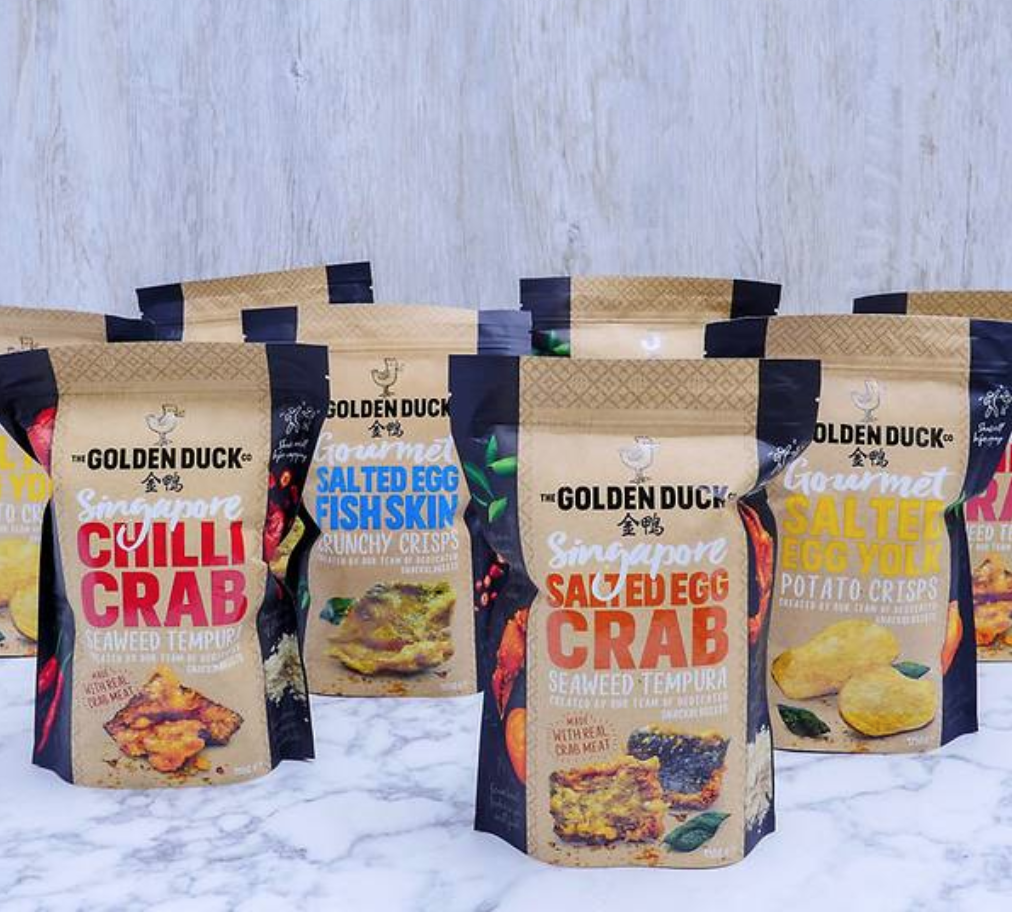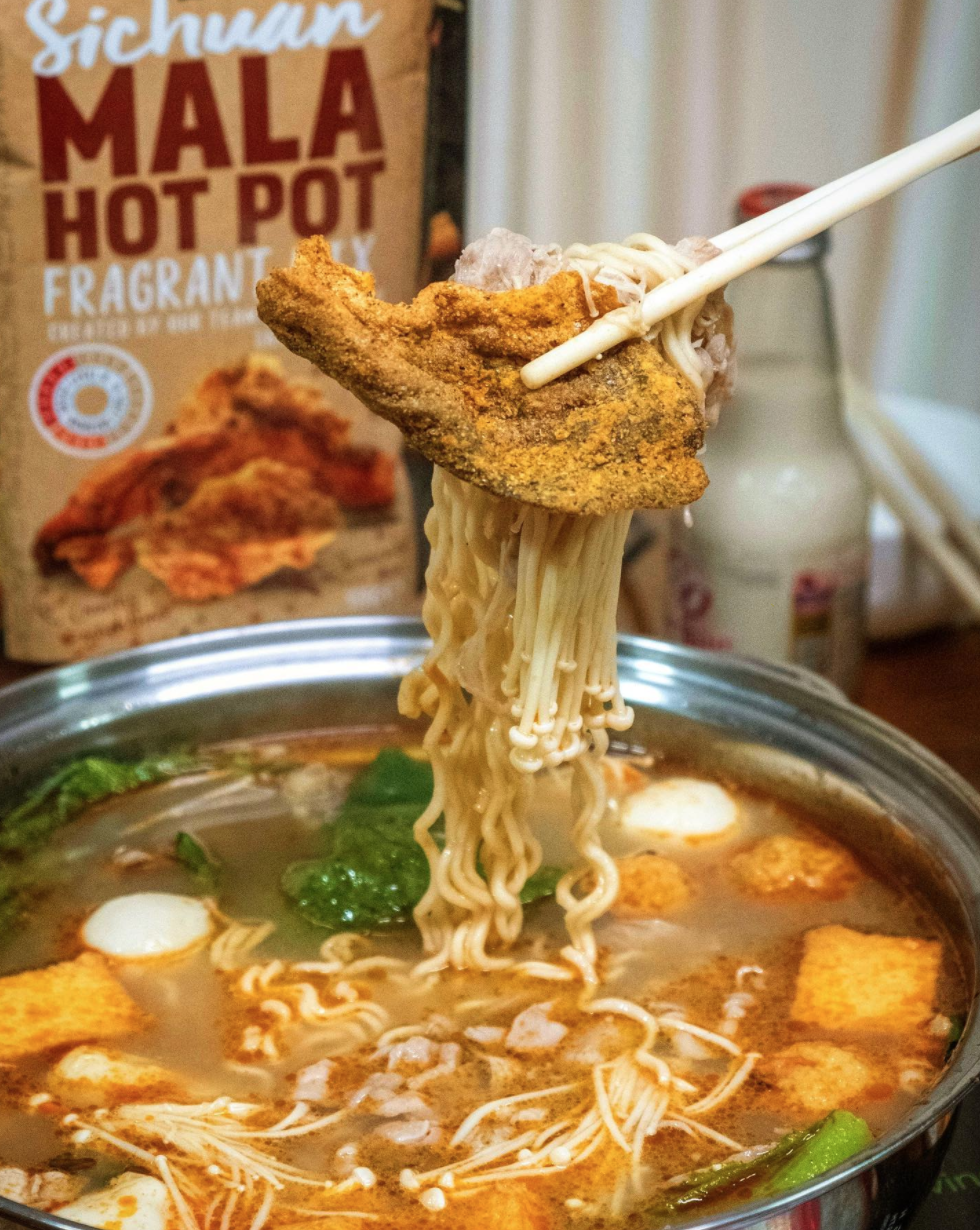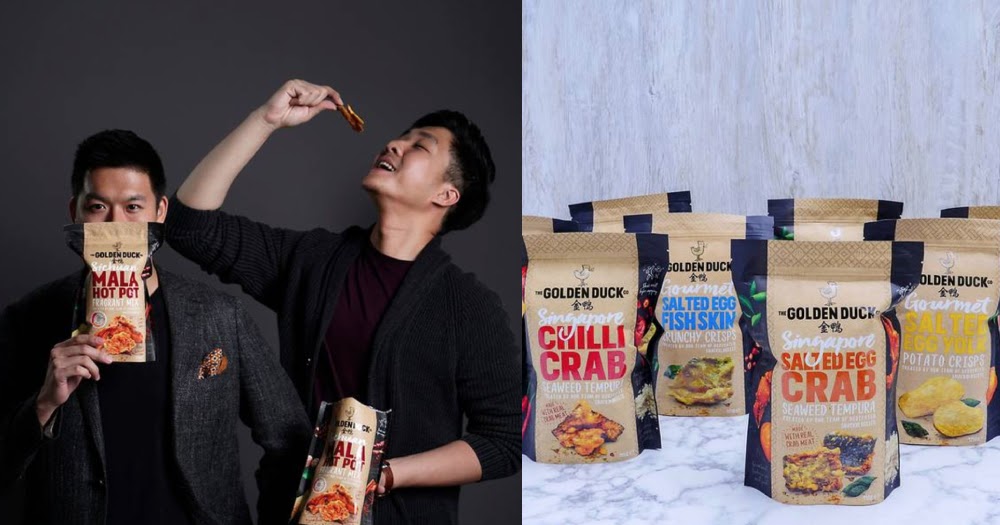Chris Hwang is an avid snacker.
In fact, he eats so much he says you can find as many as 30 packs of tidbits at any given time in his home.
Munching on the job
Sitting down with Mothership for a virtual interview, the 28-year-old, who is one half of the Singaporean duo that started snack company The Golden Duck (TGD), said not only is he consuming his own company’s products, he is also always trying out other local snack offerings to ensure TGD’s flavours stay relevant.
And to keep up with this habit, Hwang said he gyms “a lot”.
His business partner, 31-year-old Jonathan Shen, who is also a close friend, is more of a “situational snacker” who mostly eats tidbits at gatherings.
To encourage snacking in moderation, Hwang also cheekily said they added a resealable zipper to their packaging so consumers don’t have to finish the packet in one sitting, which is something that Hwang finds himself doing easily.
“I’m one of the biggest snackers in the company, and I love my job,” Hwang said with a laugh.
Made it to Forbes 30 under 30 Asia list
Hwang and Shen, who made it to the Forbes 30 Under 30 Asia list in 2017, own a thriving business now that counts its salted egg yolk-flavoured fish skin one of its most popular products.
 Image via The Golden Duck
Image via The Golden Duck
Besides Salted Egg, the company has also launched products with well-known traditional Asian flavours, such as Chili Crab and Sichuan Mala Hot Pot.
 Image via The Golden Duck
Image via The Golden Duck
 Image via The Golden Duck
Image via The Golden Duck
Each pack of snacks, priced at S$7 to S$8 per pack, is on the pricier end for snacks here.
The price is due to the high ingredient cost to produce snacks of this quality, Hwang said, adding that their products are the heart and focus of their business.
While their products have now been sold at “over 3,000 touch-points globally”, it took some time for Hwang and Shen to arrive at their winning formula for success.
Rocky start to success
Coming up with their products and perfecting them was not easy.
It took them six and nine months respectively to come up with their final potato chip and fish skin products.
Getting the perfect combination for their seasonings took a bit of experimenting too. To let their products stand out from competition, they added coconut to their salted egg yolk flavoured fish skins for that added tinge of sweetness to the overall savoury flavour.
When they first started, they had to rent the kitchen from a friend’s restaurant for a couple of hours every night from 10pm after closing, as they could not find a proper kitchen that can deal with production demands.
Their chef would then manually produce as many salted egg yolk chips as possible.
In the first few months, Shen would come by in the morning before work to pick up the snacks and bring them to their pop-up stores across the island.
This went on for about a year, during which they went without drawing a salary, putting whatever they earned back into the business instead.
When business picked up later on, they started delivering to offices in the central business district, and eventually opened their first permanent retail store in Chinatown Point in 2016.
The move proved to be the right one, as their business turned a lot more profitable since then.
Laborious production process
But it took them a while to scale their business.
Recalling the early days in their friend’s kitchen when the company was spending eight hours a day just to produce 50 packs of products, Hwang said they had to tweak every step of their production process in order to build up their business.
For instance, they had to think about what they are doing with their curry leaves and chili padi to make sure the process of churning out their products gets easier and less time-consuming.
While it was a “painstaking” process, Hwang said their effort was worth it as it managed to help them scale their business, while still maintaining the quality of their products.
And this is something the “big players” still struggle to do, Hwang said.
He then raised an example of how they had to work with their fish skin supplier in Vietnam to improve on their process to get the fish skin quality up to standard.
He explained that they had to do so after noticing a drop in quality -- no one wants to snack on crumbly fish skin, which, for those who have thought about it, is the byproduct of fish fillets.
Automation helped increase their output
Describing the nature of the industry as being “very labour-intensive”, Hwang said while about 50 per cent of their production process is now automated, the company does not intend to go into full automation, even if it means a lot more of their snacks can be churned out on the production line.
This is because the quality of their snacks is something they absolutely can’t compromise on, Hwang said, adding that they are “perfectionists” on this.
He also said with a grin that they probably make the best seaweed tempura in the market at the moment.
But the company is looking at further automation in areas such as washing of the raw fish skins and curry leaves, which will free up more time for his cooks and chefs to work on something else, he said.
Still, certain steps of the production process require a human touch.
For instance, Hwang said he has an employee who simply checks curry leaves all day for at least more than half the week, just to make sure the quality is up to par.
And “bless his soul”, Hwang said, for that is his task for more than half the week.
But he is thankful to have employees who are extremely hardworking, and who don’t mind putting in the hours to earn some extra pay, he added.
The company is also constantly tweaking the individual steps in the production process -- it takes an average of 26 steps to produce each product -- in order to achieve greater efficiency overall.
This is why visitors to their factory always notice something different about their production line each time they visit, Hwang said.
Blindsided by Covid-19
But not all is smooth-sailing for the two young entrepreneurs after business took off.
Having seen their efforts pay off and tasting immense success in the span of a few years, Hwang said they became rather complacent, and thinking that their business will continue to flourish, they ended making some mistakes that they later learnt heavily from.
It was in 2019 when they launched their products in four new markets -- Malaysia, Thailand, Taiwan and Australia.
The company was three and a half years old then, and they had thought it was the right time to expand their business beyond Singapore.
However, 2019 was a time when geopolitical tensions over issues such as the trade dispute between the United States and China, and the Hong Kong protests, heated up and spilled over to innocent bystanders.
They had not seen these events coming, and had to put a stop to their plans before they were even rolled out after they were hit by huge, upfront costs, Hwang said.
He added that it was a hasty mistake he would like to caution other entrepreneurs about.
Received bite-sized tips from the SME Centre
But that was not the end of their troubles. The onset of the Covid-19 pandemic hit businesses hard, TGD included.
Hwang said their business was impacted the most back in March and April, and even with Phase 2 of Singapore’s reopening, business has yet to return to pre-Covid levels.
This was when they received some sound business advice from SME Centre, with which they have already been in contact.
Wanting to improve on their production process, which was too labour intensive, they first sat down with a business advisor from SME Centre to explore ways to automate their production process.
Although discussions are still at an exploratory stage, kickstarting the process of consultation will prove to be valuable for the company to examine its growth potential and to carry out its long-term plan.
Their business advisor also worked with them continuously to identify gaps in their business and explore various possible solutions.
In addition to giving business advice to help TGD sustain and grow, the SME Centre helped them make the switch to working from home even before the circuit breaker started.
Unlike other companies which might have had to go through a mad scramble to allow their staff to switch to a work from home mode, TGD transitioned into that phase smoothly, having already come up with a sound plan and equipped their employees with the relevant resources to carry out their work at home.
SME Centre is a first-stop for SMEs to reach out to should they face any struggles and are in need of some broad-based advisory support, Hwang said, adding that their company is also currently working on in-depth capability building, such as developing packaging automation process and a new human resource management system with Enterprise Singapore.
The business advisors at the SME Centres help business owners to explore the resources available to formulate a more holistic plan, and make informed decisions on their next course of action, Hwang continued.
Sky’s the limit
When talking about TGD’s plans for the future, Hwang struck an optimistic tone.
While business has indeed been hit by the unexpected health crisis and other uncontrollable, external factors, Hwang said the company has been fighting on, steadily building its business for the past six months and cherishing whatever progress they have made so far.
One way they have been doing so is to focus on the digital aspect of their business, having launched snackboxes on their website for their customers to connect over snacks during the circuit breaker, and partnered with home-grown company Gryphon Tea for the local launch of the snackboxes.
He also believes in the potential of their business, saying that Singapore is the perfect base for any gourmet snack company due to its melting pot of food cultures.
There is “nowhere else in the world where you can service the taste buds” of not only the Indian and Chinese cultures, but also the American and European cultures, he said, adding that Singapore has access to the many flavour profiles that the Southeast Asian region has to offer too.
There is “no other island on the planet that can create such a storm in the global snack industry,” Hwang said.
Perhaps others can do their packaging cheaper, better and faster, but flavour-wise, Singapore is the perfect position for their snack company to be in, he added.
Reflecting on how their past experiences have helped them grow as a company, he said:
“I believe in building a strong and stable business. 2020 wasn’t the first year to teach us some valuable lessons. We’ve really grown as entrepreneurs in 2019, and a lot of hard lessons were learnt.
Besides that, in terms of the speed and direction of growth, I think the sky’s the limit.
Not to mention the support offered by the SME Centre to business owners like me is invaluable as well, especially at hard times like this during the pandemic.”
This sponsored piece by Enterprise Singapore makes the writer crave for some salted egg fish skin snacks.
Find out how the SME Centres can work with you to grow your business by making an appointment with the business advisors here.
Top image adapted via The Golden Duck
If you like what you read, follow us on Facebook, Instagram, Twitter and Telegram to get the latest updates.
